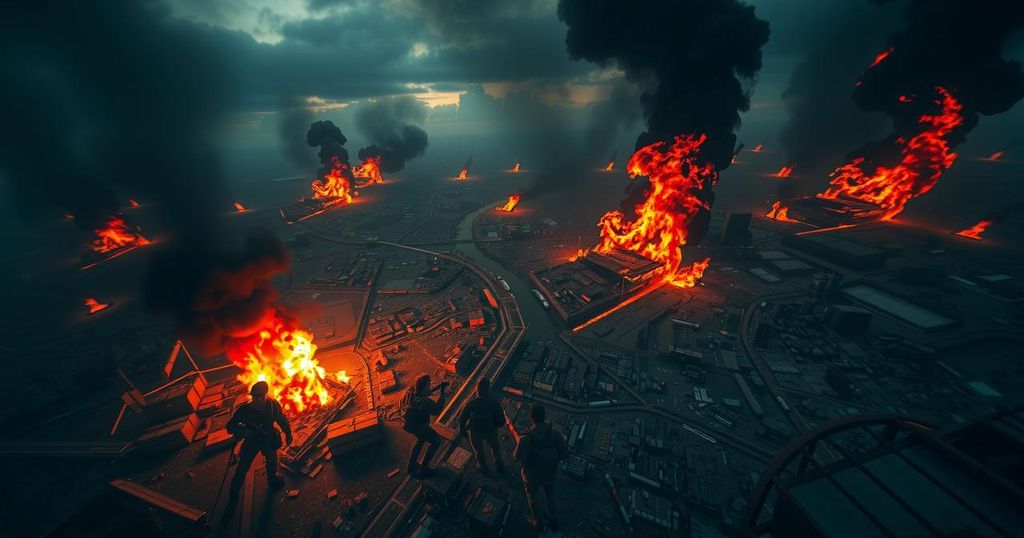Recent Developments in the Middle East: Diplomatic Efforts Amid Escalating Conflict and Humanitarian Crisis
Recent developments in the Middle East involve US officials pursuing diplomatic efforts to facilitate ceasefires in Gaza and Lebanon while deterring Iranian retaliation against Israel. Meanwhile, the humanitarian situation in Gaza has deteriorated significantly, with aid deliveries plummeting and medical facilities under severe pressure as Israeli airstrikes continue. The UN Security Council has expressed grave concerns regarding the impact of Israeli legislation on UN humanitarian agencies, further complicating the crisis.
US officials are actively engaging in the Middle East amid rising tensions, particularly concerning potential ceasefires in Gaza and Lebanon, and are aiming to prevent a retaliatory response from Iran following recent Israeli military operations. In Lebanon, Prime Minister Najib Mikati expressed optimism about the possibility of achieving a ceasefire between Israel and Hezbollah in the imminent future. Iran has indicated it may respond decisively to Israeli attacks prior to the upcoming US presidential elections, contradicting earlier efforts to downplay the situation. The White House cautioned Iran against any provocative actions while underscoring its commitment to support Israel. Recent Israeli airstrikes in Lebanon resulted in the deaths of at least 19 individuals in Baalbek, where evacuation orders were issued. Additionally, reports indicate that aid deliveries to Gaza have drastically decreased, with UN data revealing that only 836 aid trucks have entered the territory this month—significantly below the pre-war average. Medical facilities in northern Gaza continue to face dire circumstances amid ongoing attacks, with reports confirming that the only operational hospital in the region was struck, leading to further destruction of vital supplies. Senior US officials, including CIA Director William Burns and CENTCOM Commander Erik Kurilla, are on-site to discuss regional security and humanitarian conditions. They follow a series of Israeli strikes that have elicited widespread international condemnation. The UN Security Council has voiced concerns regarding an Israeli prohibition on the UN Relief and Works Agency (UNRWA), which is responsible for vital aid to Palestinian refugees, emphasizing its crucial role in humanitarian efforts in Gaza. In summary, the precarious situation in the Middle East is characterized by increasing military confrontations, humanitarian crises, and diplomatic efforts to stabilize the region amidst the looming threat of broader conflict. Discussions regarding ceasefires are paramount as various stakeholders emphasize the urgent need for humanitarian interventions and a resolution to ongoing hostilities.
The ongoing conflict in the Middle East, particularly involving Israel, Hamas, Iranian influence, and the humanitarian situation in Gaza, has reached a critical juncture. The United States plays a central role in attempts to mediate peace and ensure stability in the region, especially in the context of escalating military actions and the forthcoming US electoral cycle. As Israeli strikes have continued against perceived threats in Gaza and Hezbollah in Lebanon, the humanitarian crisis has deepened, with significant restrictions on aid and medical supplies affecting civilian populations. Diplomatic dialogues are emerging as a pivotal approach amid fears of retaliation from Iran, which has historically positioned itself as a regional adversary to Israel. The involvement of key US officials illustrates the significance of international diplomacy in efforts to mitigate conflict and alleviate suffering in affected areas.
The current dynamics in the Middle East highlight the gravity of a multifaceted crisis involving military escalation, humanitarian needs, and diplomatic negotiations. The urgent calls for a ceasefire, coupled with international concern over Iran’s potential responses and the challenges faced by aid organizations, underscore the precarious nature of peace in the region. As key stakeholders engage in discussions aimed at stabilization, the humanitarian conditions in Gaza demand immediate attention and action.
Original Source: www.cnn.com




Post Comment